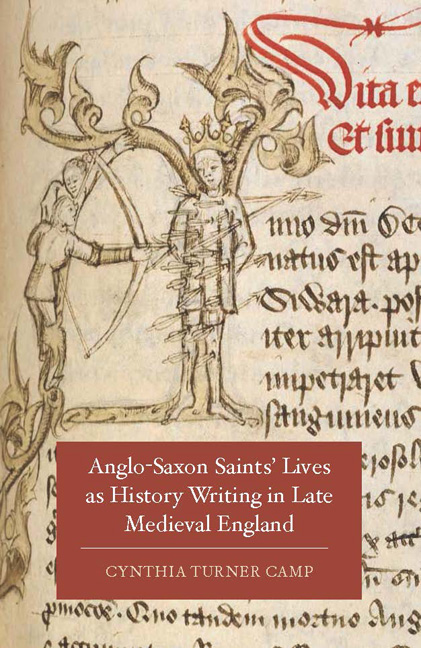Book contents
- Frontmatter
- Dedication
- Contents
- List of Illustrations
- Acknowledgments
- Abbreviations
- Introduction
- 1 Edith of Wilton and the Writing of Women's History
- 2 Audrey Abroad: Spiritual and Genealogical Filiation in the Middle English Lives of Etheldreda
- 3 Henry Bradshaw's Life of Werburge and the Limits of Holy Incorruption
- 4 The Limits of Narrative History in the Written and Pictorial Lives of Edward the Confessor
- 5 The Limits of Poetic History in Lydgate's Edmund and Fremund and the Harley 2278 Pictorial Cycle
- Bibliography
- Index
Introduction
Published online by Cambridge University Press: 05 May 2015
- Frontmatter
- Dedication
- Contents
- List of Illustrations
- Acknowledgments
- Abbreviations
- Introduction
- 1 Edith of Wilton and the Writing of Women's History
- 2 Audrey Abroad: Spiritual and Genealogical Filiation in the Middle English Lives of Etheldreda
- 3 Henry Bradshaw's Life of Werburge and the Limits of Holy Incorruption
- 4 The Limits of Narrative History in the Written and Pictorial Lives of Edward the Confessor
- 5 The Limits of Poetic History in Lydgate's Edmund and Fremund and the Harley 2278 Pictorial Cycle
- Bibliography
- Index
Summary
The fifteenth-century canons of Stone Priory, Staffordshire had much to be proud of. They boasted a long and productive patronage relationship with the up-and coming Stafford family, evidenced by a versified history of Stone's founders and patrons that hung on the choir walls. They also possessed the relics of two Anglo-Saxon martyrs, Wulfhad and Ruffin, as advertised to the curious visitor by a second tabula containing their Middle English legend. According to this tabula's poem, these two Mercian princes, sons of the saintly Eormenhild and unsaintly King Wulfhere, were converted by the eremetic Saint Chad but then murdered by their apostate father. After the murder, Eormenhild counseled Wulfhere to confess to Chad and reconvert; she then founded Stone Priory as a nunnery on her sons' burial site. Although this legend, in its original Latin form, is a fantastical confection of the twelfth or thirteenth century, many of its details fall within the scope of historical plausibility. According to longstanding tradition, Wulfhere was married to Eormenhild; during his reign, Chad did preach to the Mercians, albeit as a bishop not a recluse; Wulfhere's father, Penda, did commit violent acts against Christians; and Wulfhad is a reasonable Anglo-Saxon name for the son of Wulfhere. When this Latin legend was translated and posted at Stone, the English poet finessed these ‘historical’ details to fit Stone's local traditions and to interweave this saintly foundation story into the patronage history of the priory. Referencing one another, the two tabulae present Stone's glorious, continuous history as originating in conversion-era England and continuing through the benefactions of the Stafford family.
The Stone legend of Wulfhad and Ruffin encapsulates the major problematics of this study. Arguing that such early English saints were uniquely useful for constructing nuanced historical narratives, I contend that their lengthy vernacular lives are as much ‘history’ as they are ‘hagiography’, if by ‘history’ we mean ‘the refashioning of the past into a form comprehensible and usable by the present’. For, although these lives serve their expected devotional functions, they also recreate England's past as a sacred space desirable to late medieval institutions, royal and religious.
- Type
- Chapter
- Information
- Publisher: Boydell & BrewerPrint publication year: 2015



